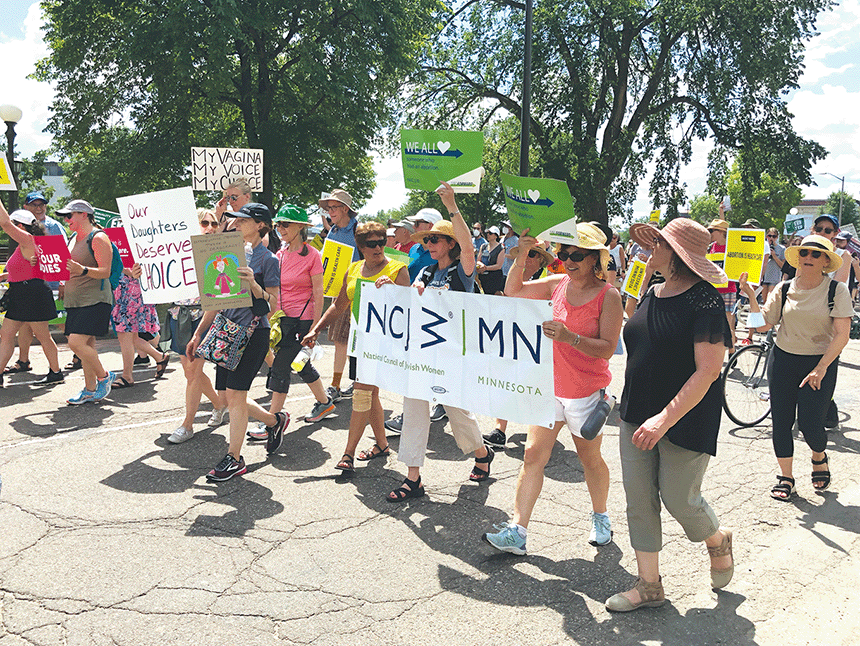By ELANA WARREN / Assistant Editor
Minnesota is celebrated as a state that has abortion health care, but the fight is ongoing. Our Future: March for Abortion Access at the State Capitol on July 17 showed that thousands of people in the Twin Cities are looking to expand access to abortion care. They are also aware that abortion being legal in Minnesota is not necessarily permanent.
July 17 was a Sunday: a hot and rainy day, but notably not a Saturday. Rallies often take place on Saturdays, but the National Council of Jewish Women and Jewish Community Action are members of the coalition UnRestrict Minnesota and were organizers of the event. A Sunday rally allowed Jews who observe Shabbat, as well as abortion clinic workers who see patients on Saturdays, to participate.

July 17 also had Jewish significance. That date on the Hebrew calendar was the 17th of Tammuz, a day of fasting in remembrance of the breaching of the walls of Jerusalem and the destruction of the second temple.
Prior to the march, Adath Jeshurun Congregation’s Hazzan Joanna Dulkin spoke.
“Today, we stand together because the walls of our democracy have been breached,” she told the crowd. “We stand here today because the walls of our bodily autonomy have been breached.”
Dulkin reminded those gathered that abortion rights are not only a women’s issue but a religious freedom issue. She continued, “Over 80 percent of Jewish people support abortion access. We believe in our community that life begins when a baby’s head emerges — that’s it. A religious and philosophical debate should not be made into the law of the land. Abortion bans are against my religion.”
After the march, NCJW Executive Director Erica Solomon spoke at the Minnesota State Capitol. “We are here because abortion restrictions and bans impede our right to freedom, religious and otherwise,” she said. “And most of all, we are here because we deeply believe that we are strongest in our path to justice when we walk together.”
Politicians, organizers, women with their own reproductive rights stories, artists and abortion providers shared the microphone for an hour at the Capitol. Speakers from groups such as the Black Maternal Health Caucus and Civil Disabilities emphasized that access to abortion care is also more than a women’s and religious freedom issue — abortion is health care, abortion is LGBTQ+ rights, abortion is Black equity and abortion can save lives.
Legal change
While activists say the fight cannot stop — Minnesota laws could change to be more or less restrictive in the future, and there is more to do for equitable access to abortion care — they had a major win about a week prior to the march.
Following the Supreme Court decision to refer abortion rights to the state level on June 24, Minnesota expanded abortion access with a decision on Doe v. Minnesota, a case brought by Our Justice and the Lawyering Project in 2019. It challenged over a dozen state abortion laws for being unconstitutional.
On July 11, Ramsey County District Judge Thomas Gilligan eliminated the enforcement of a 24-hour waiting period between consulting a physician and having an abortion. Gilligan’s decision also struck down the informed consent script that requires specific information be given to patients, and the requirement that minors must notify both parents or get a court waiver prior to getting an abortion.
The judge’s ruling also grants nonphysicians to perform abortions, and allows abortions, even after the first trimester, to take place outside of hospitals.
Gilligan’s decision upholds other regulations: physicians must report certain abortion information to the state; however, the ruling struck criminal penalties for noncompliance.
The 60-day appeal period for the decision is not over, but Attorney General Keith Ellison announced July 28 he will not appeal the ruling.
Organizers have also introduced new initiatives since the overturning of Roe v. Wade. The groups Our Justice and Pro-Choice Minnesota launched a campaign to get Minneapolis to provide direct funding for abortion access, as there are still patients facing barriers, and Minnesota is already seeing more patients traveling from out of state for abortion care.
Further, Medicaid helps patients receive abortions for $10 out of pocket, but that means providers operate at a loss. The state legislature controls reimbursement to providers, so organizers want the state to expand its budget for abortion care.
Some might ask, “Why march when abortion is legal in Minnesota and the state even eliminated multiple restrictions?” The activists at the Our Future march would answer that there is more to be done to make abortion more accessible for all and keep it that way.
Esther Goldberg-Davis, who represented NCJW as its board president, explained her participation in the July 17 march and rally: “As a woman who has the privilege to have a family in the way that I wanted, I want to make sure that that is a right for other people who have the opportunity to bear children or choose not to.”
(American Jewish World, August 2022)



















